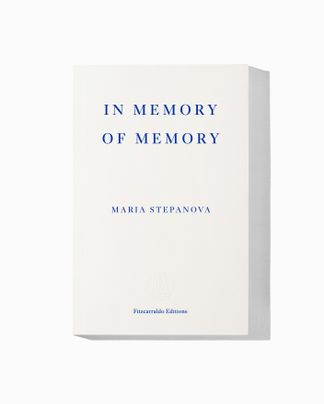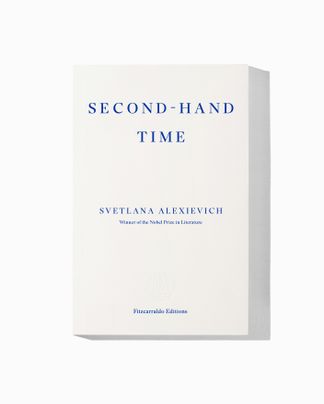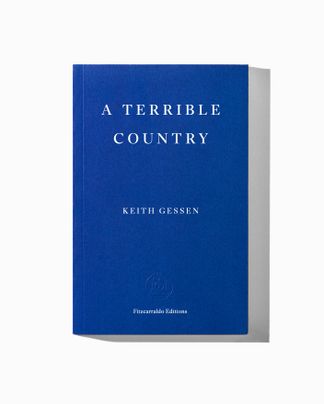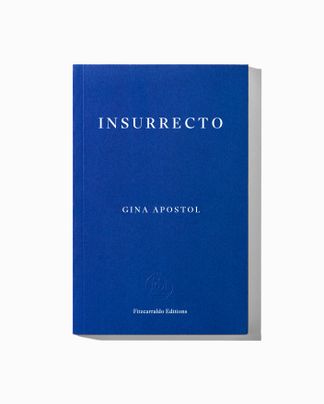What is a place? A place where things happened, horrible things, the traces of which have been erased? Ukraine, for a long time, has been filled with these ‘inconvenient places’ which embarrass everyone, no matter which side of post-Soviet memorial politics they stand on: crimes of Stalinism, crimes of Nazism, crimes of nationalists, crimes of Russians; the killings follow one after another on this battered territory which aspires only to a form of peace and normality.
With the photographer Antoine d’Agata, before the Russian invasion of Ukraine, Jonathan Littell began to survey Babyn Yar, the site of the 1941 massacre of the Jews of Kyiv, and the traces left on the landscape. The war came to interrupt their work. It resumed quite quickly in another form, in another place, the small suburban town of Bucha, which became infamous after the discovery of the atrocities perpetrated there by the Russian occupying forces. Again, a place where things happened; again, a place whose traces we erase as quickly as possible. How then to write, how to photograph, when there is literally nothing to see – or almost nothing?
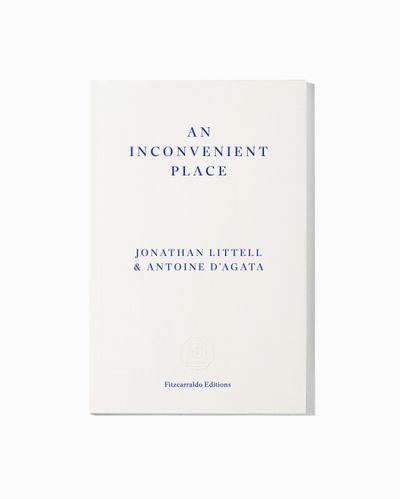
An Inconvenient Place
Translated by Charlotte Mandell
French paperback with flaps, 352 pages
Published 12 September 2024
An Inconvenient Place
Translated by Charlotte Mandell
ONCE AGAIN
1. In 1990, a woman who was close to me at the time asked Maurice Blanchot to contribute to a journal she was editing. His reply took the form of two letters: one, handwritten and personal, the other, typewritten and public. I translated the latter (under a pen name) for the journal. It began: ‘Dear Madam, please forgive me for answering you with a letter. Reading yours, in which you ask me to write a text for inclusion in an issue of an American academic journal (Yale) on the topic: ‘Literature and the Ethical Question’, I was frightened and nearly in despair. ‘Once again, once again,’ I said to myself. Not that I pretend to have exhausted an inexhaustible subject, but on the contrary with the certainty that such a subject returns to me because it is intractable.’
2. An intractable subject that returns to me. One could just as well say a stone thrown at my head that stuns me, makes me stupid. Even before I began I was already exhausted. Blanchot again: ‘To want to write, how absurd: writing is the decay of the will.’
3. It was early 2021, when Europe was emerging with difficulty from Covid. A friend proposed I write about Babyn Yar. ‘Why don’t you write something about Babyn Yar? You should write about Babyn Yar.’ Again? Oh no, not again.
4. This friend was very persuasive. ‘Listen, you’re working on Chernobyl,’ he said. ‘Babyn Yar is the same, it’s a Zone.’ The idea was not uninteresting. All the more so since the term ‘Exclusion Zone’, used in both French and English, is not an accurate translation: Zona vidchuzhennya, the Ukrainian term, as well as the Russian term Zona otchuzhdeniya, is closer to ‘Alienation Zone’. For a while, I vaguely thought about making it my title. But that was a dead end.
5. Antoine d’Agata happened to be in Kyiv. ‘What if we did it together?’ I asked him. When in dismay and confusion, it’s always better to have company.
6. We visited the place together. This was in April, it was grey, the trees were bare. There wasn’t really much to see. I drew up an inventory: two parks, a forest, one large ravine and two small ones, an underground river, monuments (lots of monuments), three churches (one very old, two new), a synagogue, also brand-new, a psychiatric asylum, a psychiatric prison, an unfinished psychiatric institute, two cemeteries (one Orthodox, the other military), the traces of two other erased cemeteries (one Jewish, the other Orthodox), the Ukrainian television offices, the Ukrainian television tower, apartment buildings, shops, schools and nurseries, an abandoned cinema, a metro, a maternity ward, a hospital, a morgue. Antoine was just as unconvinced as I was: ‘You want me to photograph what, exactly?’ Better to drop the whole thing, I said to myself. Forget this story, move on to something else.
7. John Steinbeck also went to Kyiv with a photographer, Robert Capa, in 1947. They didn’t go to see Babyn Yar. Steinbeck doesn’t mention it in his book. He must not even have known of its existence.
8. Almost twenty years later, in 1965, at the request of an Israeli newspaper, Elie Wiesel visited the USSR. He knew very well what Babyn Yar was, but he couldn’t locate the site on any map of Kyiv. It was as if the place had disappeared.
The official guides at Intourist refuse to take you there. Even to talk about it. If you insist, they reply: “It’s not worth visiting; there’s nothing to see.” And they are right. No point bothering. You’ll discover nothing there. No monument, no commemorative plaque. In Babi-Yar, the main thing is evaded. What you see with the naked eye you can also see anywhere else. Anywhere in Kiev. In every square, every public place. It’s as if Babi-Yar extended to the entire city…. [T]he guides at Intourist are right: Babi-Yar is a place just like any other.
9. Two things can be said about Babyn Yar: it’s not just an idea, but it’s also not entirely a place.
10. Perhaps you could also say it’s a monad? In his course on Leibniz, Gilles Deleuze defines the monad as a subject insofar as it expresses the totality of the world. ‘My soul expresses the entire world but it clearly expresses only a small part of the world, which is my département [my territory, Leibniz writes elsewhere]. My département is limited.’ What Leibniz says about the subject is also true for the place: Babyn Yar (as well as other places that we will also visit) expresses, if not the whole world, then at least a certain dimension of the world much vaster than its few acres folded under a banal neighbourhood of Kyiv.
11. The problem is history. In Babyn Yar, history too is folded. On the surface, it acts like a gendarme with his cape and kepi, waving his white truncheon: ‘Move on, there’s nothing to see here.’ Which might encourage someone slightly resistant precisely to move on, to move on endlessly.
12. To survey, to list, to photograph, to describe. Day after day, season after season. Sometimes together, sometimes alone.
13. It wasn’t easy, but I finally wrote a first version of this book. While I was writing, the Russian Federation was massing its troops at the Ukrainian border and launching manoeuvres in Belarus, deploying hundreds of assault tanks two hours by road from Kyiv. According to my notes, I finished the manuscript on 22 February 2022. On the 24th, at 5.07 a.m. local time, Russia launched a series of strikes on Ukraine and began its invasion. I learned the news when I woke up, at around 9 a.m. Already, the text I had written became entirely irrelevant. But that was the least of my concerns. Today I’m starting over, from an entirely different perspective. Once again. It is 8 November 2022, the 258th day of the war, and nothing is the same, not the cities of Ukraine, not the lives of my friends, not the questions that matter. To speak about Babyn Yar no doubt still has meaning, but no longer the same one.
(…)
‘Of the three ways of observing – as witness, whose meticulous, dispassionate descriptions become the fabric of the past; as voyeur, devouring the sight of the present with limitless appetite; as seer, finding in the now intimations of things to come – Jonathan Littell chooses all three at once. He doesn’t flinch from the bare, intimate detail of Russia’s visitation of death and destruction on Ukraine. Although sometimes the reader might prefer it if he did, it’s not because Littell’s visions are naked of euphemism, but because it falls to the reader themself to clothe these events in meaning. With his companion d’Agata, Littell, so fascinated by monuments, has made one with this book.’
— James Meek, author of To Calais, In Ordinary Times
‘In An Inconvenient Place, Jonathan Littell takes us on a journey into the most disturbing of modern human landscapes, from the jumble of horrors that were the ravines of Babyn Yar, into the cellars of Bucha. In chiselled, uncompromising prose, accompanied by haunting photographs by Antoine d’Agata, Littell’s unforgettable account is nothing less than a moral triumph over the willful amnesia imposed on history’s savageries by its perpetrators.’
— Jon Lee Anderson, author of Che Guevara
‘An impressionistic rather than analytical book, it is not intended as a definitive account of Ukraine’s recent history. That will be for historians to provide, and Jonathan Littell knows how quickly words can be reduced to irrelevance. He and Antoine d’Agata have produced an insightful and frequently terrifying document whose reflections on depravity and resilience are likely to prove durable, come what may.’
— Luke Warde, Times Literary Supplement
‘A narrative, both arduous and luminous, that takes every possible route through a history mired in tragedy.’
— Télérama
‘What makes this powerful book so impressive is that it confronts everything – to the point of veering off course, of travelling far back into the past, of accumulating the twists, the strata, of narrative, image and investigation. At once a historical study, a testimony of the events unfolding as you read these lines, an inquiry into war crimes and a remembrance of the dead, it comes as close as possible to what its authors came to seek in the streets of Ukraine.’
— Le Monde
‘An important chronicle of the enigma of violence and evil, and the tragedy of the Ukrainian people.’
— France Inter
‘Littell and d’Agata, true aesthetes of disaster, document the history of the violence that stalks the fate of the Ukrainian people, now terrorized by the Russian army. The beauty of the book, embedded in its very tragedy, lies in its way – at once delicate and direct – of placing the ashes of this blood-streaked land into a literary urn, where nothing is forgotten, where everything captures the appalled gaze.’
— Les Inrockuptibles
‘A singular and disturbing work that ties text to image… An Inconvenient Place examines the war in Ukraine and draws its power from the interplay between the words of writer Jonathan Littell and the haunting images of photographer Antoine d’Agata.’
— L’Obs
‘Littell excels at saying the unsayable, almost to a fault. An Inconvenient Place demands attentive reading; it battles against silence and oblivion.’
— Le Figaro Littéraire
Jonathan Littell was born in New York, and grew up in France. He now lives in Spain. His best-known novel, The Kindly Ones, was originally published in French in August 2006, and won the most prestigious literary prize in France, the Prix Goncourt, as well as the Académie Française’s Grand Prix de Littérature. He has since published books on Chechnya, Syria, Francis Bacon, as well as a novel and several novellas. He has written for Le Monde, the Guardian and the London Review of Books.
Antoine d’Agata is a French photographer born in Marseille in 1961. He studied photography at the International Center of Photography in New York City, under the tutelage of Larry Clark and Nan Goldin. D’Agata joined Magnum Photos in 2004. He has published more than a dozen books, and directed three films.
Charlotte Mandell has translated over fifty books of fiction, poetry and philosophy from French, including works by Marcel Proust, Maurice Blanchot, Abdelwahab Meddeb and Jean-Luc Nancy, and the majority of Jonathan Littell’s work, including The Kindly Ones. Her translation of Compass by Mathias Énard was shortlisted for the International Booker Prize and was the recipient of the 2018 ALTA National Translation Award in Prose. She was recently named a Chevalier de l’Ordre des Arts et des Lettres by the French government and has received the Thornton Wilder Translation Prize from the American Academy of Arts and Letters.

